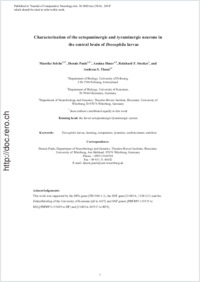Characterization of the octopaminergic and tyraminergic neurons in the central brain of Drosophila larvae
- Selcho, Mareike Department of Biology, University of Fribourg, Switzerland - Department of Neurobiology and Genetics, Theodor-Boveri Institute, Biocenter, University of Würzburg, Germany
- Pauls, Dennis Department of Biology, University of Fribourg, Switzerland - Department of Neurobiology and Genetics, Theodor-Boveri Institute, Biocenter, University of Würzburg, Germany
- Huser, Annina Department of Biology, University of Fribourg, Switzerland - Department of Biology, University of Konstanz, Germany
- Stocker, Reinhard F. Department of Biology, University of Fribourg, Switzerland
- Thum, Andreas S. Department of Biology, University of Fribourg, Switzerland - Department of Biology, University of Konstanz, Germany
-
01.04.2014
Published in:
- Journal of Comparative Neurology. - 2014, p. –
English
Drosophila larvae are able to evaluate sensory information based on prior experience, similar to adult flies, other insect species and vertebrates. Larvae and adult flies can be taught to associate odor stimuli with sugar reward and prior work has implicated both the octopaminergic and dopaminergic modulatory systems in reinforcement signaling. Here we use genetics to analyze the anatomy, up to the single-cell level, of the octopaminergic/tyraminergic system in the larval brain and suboesophageal ganglion. Genetic ablation of subsets of these neurons allowed us to determine their necessity for appetitive olfactory learning. These experiments reveal that a small subset of about 39 largely morphologically distinguishable octopaminergic/tyraminergic neurons is involved in signaling reward in the Drosophila larval brain. In addition to prior work on larval locomotion, these data functionally separate the octopaminergic/tyraminergic system into two sets of about 40 neurons. Those situated in the thoracic/abdominal ganglion are involved in larva locomotion, whereas the others in the suboesophageal ganglion and brain hemispheres mediate reward signaling.
- Faculty
- Faculté des sciences et de médecine
- Department
- Département de Biologie
- Language
-
- English
- Classification
- Biological sciences
- License
- License undefined
- Identifiers
-
- RERO DOC 209923
- DOI 10.1002/cne.23616
- Persistent URL
- https://folia.unifr.ch/unifr/documents/303363
Statistics
Document views: 125
File downloads:
- sto_cot.pdf: 378
